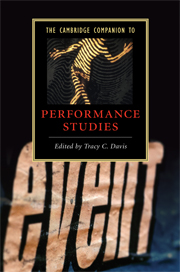Book contents
- Frontmatter
- Introduction: the pirouette, detour, revolution, deflection, deviation, tack, and yaw of the performative turn
- Part I Social polities: history in individuals
- Part II Body politics: the individual in history
- 7 Live and technologically mediated performance
- 8 Moving histories: performance and oral history
- 9 What is the “social” in social practice?: comparing experiments in performance
- 10 Live art in art history: a paradox?
- 11 Queer theory
- Further reading
- Index
8 - Moving histories: performance and oral history
from Part II - Body politics: the individual in history
Published online by Cambridge University Press: 28 January 2009
- Frontmatter
- Introduction: the pirouette, detour, revolution, deflection, deviation, tack, and yaw of the performative turn
- Part I Social polities: history in individuals
- Part II Body politics: the individual in history
- 7 Live and technologically mediated performance
- 8 Moving histories: performance and oral history
- 9 What is the “social” in social practice?: comparing experiments in performance
- 10 Live art in art history: a paradox?
- 11 Queer theory
- Further reading
- Index
Summary
Oral history studies are fed by many research streams, including folklore, memory studies, trauma studies, anthropology, psychology, communication studies, critical cultural studies, and, increasingly, performance studies, raising the critical question: how do performance analytics change our understanding of and approach to experience narrative (oral history, life history, stories of collective experience)? / Performance and narrative / In the late 1970s, after the publication of Richard Bauman's landmark “Verbal Art as Performance,” folklore/vernacular studies attended more vigorously to processes of transmission, shifting the focus of study from the re-presentation of verbal art as fact (or artifact) to the rehearsal of site-specific interaction identified as performance. This shift relied on Bauman's four criteria: competency (demonstrable skill or status as a storyteller); intensity (the sense of a special time, space, and ways of seeing and knowing experience to which performance indicators “key” in audiences); emergence (the unpredictable and uncontrollable shape, affect, and outcomes of time-space aesthetics); and changing structures of social relations (immediate changes among participants heralding change on a larger scale “as if” by proxy). Bauman positioned performance as a critical frame that illumined the authority, reflexivity, and transformative power of some art acts. Thus Bauman encouraged us to answer the persistent question, what is performance?, by asking instead: in what ways is it useful to call a particular act or set of interactions “performance”?
- Type
- Chapter
- Information
- The Cambridge Companion to Performance Studies , pp. 120 - 135Publisher: Cambridge University PressPrint publication year: 2008
- 4
- Cited by



